Introduction
Rio Tinto, a global mining giant, has reached a significant settlement of nearly $139 million to end a prolonged class action lawsuit concerning its Oyu Tolgoi copper mine in Mongolia. The lawsuit, spearheaded by US hedge fund Pentwater Capital, accused the company of concealing critical delays and budget overruns during the underground expansion of the $7 billion project.
Main Body
The allegations centered on Rio Tinto's failure to disclose the true status of the Oyu Tolgoi mine expansion between 2018 and 2019. Pentwater Capital claimed that both Rio Tinto and its then-subsidiary Turquoise Hill Resources violated federal securities laws by providing misleading assurances about the project’s progress. In reality, the expansion was reportedly 2.5 years behind schedule and over $1 billion above budget.
Turquoise Hill Resources, which owned 66% of the mine while the Mongolian government held 34%, was majority-owned by Rio Tinto until a full buyout in 2022 for $3.3 billion. The project finally commenced operations in 2023. The lawsuit, filed in 2020 in the US District Court for the Southern District of New York, sought damages for Turquoise Hill shareholders.
Rio Tinto's preliminary settlement of $138.75 million, filed on Wednesday, awaits approval from a District Court judge. The company emphasized that the agreement does not imply any admission of wrongdoing and was pursued to avoid further litigation costs and uncertainty. Legal fees could account for up to 13% of the settlement, approximately $18 million, along with additional expenses of up to $2.6 million.
This settlement also closes claims against former CEO Jean-Sebastien Jacques, who resigned in 2021 following separate controversies over Rio Tinto’s destruction of culturally significant Aboriginal sites in Australia. This raises broader questions about corporate accountability in the mining industry. How can stakeholders ensure transparency in such high-stake projects? Given the increasing scrutiny on environmental and cultural impacts, as seen in global mining scandals, Rio Tinto’s approach to crisis management and disclosure practices will likely remain under the spotlight.
Opinion and Analysis
Objectively, this settlement highlights the ongoing challenges multinational mining companies face in balancing operational transparency with shareholder expectations. The Oyu Tolgoi project, one of the world’s largest copper mines, is critical to global supply chains, especially amid rising demand for copper in renewable energy technologies. However, repeated delays and cost overruns reflect systemic issues in project management and communication. In the context of current hot topics like sustainable mining and ethical corporate governance, Rio Tinto’s $139 million payout may be seen as a necessary step to rebuild trust, but it also underscores the need for stricter oversight and accountability mechanisms. Are current regulations enough to prevent such discrepancies, or do we need a global framework for mining transparency?
